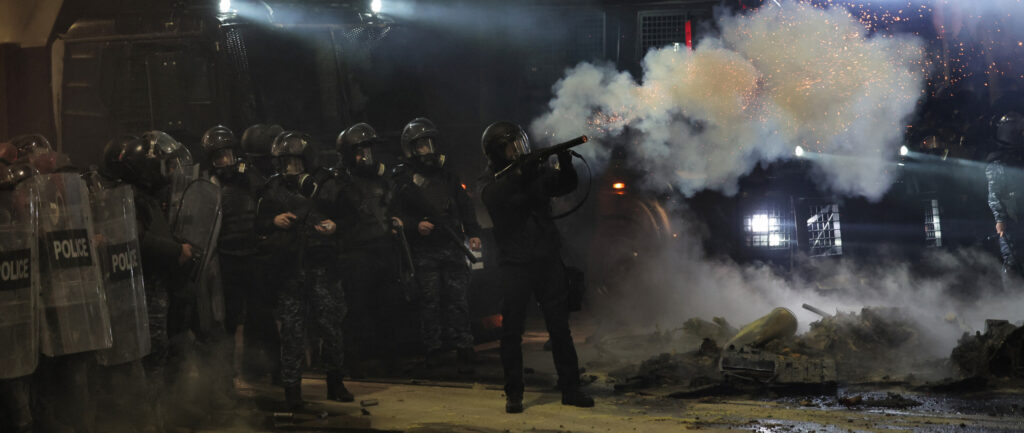Hundreds of protesters in Georgia faced brutal dispersal tactics, arbitrary detention, torture and other ill-treatment during a crackdown on anti-government rallies over the past two weeks, Amnesty International revealed today.
Drawing on testimonies from victims of police violence, human rights defenders and video evidence, the detailed briefing highlighted widespread human rights violations, including the unlawful use of force, torture and other ill-treatment and the deliberate targeting of journalists. Amnesty International’s findings point to state-sanctioned repression aimed at silencing dissent.
Protesters continue to take to the streets after a violent crackdown escalated after largely peaceful protests began on Nov. 29 and has been repeated almost daily since. To date, more than 460 people have been detained, with about 300 reporting severe beatings and other ill-treatment.
“Thanks to the work of journalists who risk their lives, the brutal response of Georgian police to protests has been seen around the world. However, more brutal and less obvious abuses occur where people can’t see them: in custody, during protests “Torture and other ill-treatment were widespread, resulting in dozens of broken bones, fractures and concussions, and authorities continued to arrest protesters, taking them away one by one from the streets and from their homes,” said Deprose Muchena, senior director at Amnesty International. (Deprose Muchena) said.
More brutal and less visible were the abuses that occurred out of sight: widespread torture and other abuse of detained protesters, resulting in dozens of broken bones, fractures, and concussions
Deprose Muchena, Senior Director, Amnesty International
“This cycle of injustice is perpetuated by the courts, which imposed the harshest fines and jail terms on more than a hundred protesters who were arbitrarily detained. Impunity for police crimes must end, and those who are arbitrarily detained for peaceful protest must The person must be released immediately.
The protests were repeatedly met with unlawful force, including tear gas, rubber bullets and water cannons allegedly mixed with chemical irritants. This harsh response heightened tensions and some isolated acts of violence occurred, largely in response to escalating tactics used by police. More than 100 protesters suffered serious injuries, including broken bones and concussions. Journalists were particularly targeted, with more than 50 media staff reportedly injured.
Amnesty International has verified numerous incidents of torture and other ill-treatment, some of which have revealed the organizational and systemic nature of these abuses, including forced confessions and the denial of timely medical care.
“Everyone… [who was taken to] The police station is covered in blood. About seven or eight people were in critical condition – one of them had a broken arm and his face was so swollen that he couldn’t open his eyes… The police handed us pre-written protocols and told us that if we did this, things would get “complicated.” Sign,” photographer Gela Megrelidze, who was detained on December 1, told Amnesty International.
Lazare Maglakelidze was detained on December 2 and was allegedly beaten by several police officers while in custody, resulting in a broken nose, concussion and serious head injuries. He told Amnesty International: “[police] Those vans had been emptied from the inside and darkened and used to torture protesters. Everyone, about 50 to 100 police officers, participated and you could hear them shouting “The fun starts now” as they led us to the van. Anyone walking around is free to attack you, hit you, slander you in any way they want.
Anyone is free to attack you, hit you, defame you in any way they want
Georgian protester Lazare Maglakelidze was detained on December 2
One particularly harrowing case is that of Davit Abuladze, a deaf protester who was arrested by police on 3 December. He was not arrested during the mass demonstrations but was arrested afterward while getting food and walking some distance away from where the protests were taking place. He was allegedly beaten in the street and in a police car before being detained for several hours without medical assistance or an interpreter. Davitt had to be hospitalized with serious injuries including a head injury and a concussion.
Since December 4, intimidation and violence against protesters have been carried out not only by law enforcement officers, but also by unknown persons with masks and guns. These individuals, ostensibly linked to the authorities, have repeatedly intimidated and attacked protesters and journalists, with clear complicity with the police.
Despite hundreds of reports of police brutality, no law enforcement officers or members of armed masked groups have been identified or held accountable. Courts often prioritize police testimony over video evidence and witness testimony, undermining the right to a fair trial and perpetuating state-sanctioned impunity.
Amnesty International calls on the Georgian authorities to end the repression, ensure justice for the victims, and safeguard the right to peaceful protest. The international community must unite to ensure that governments fulfill their human rights commitments.


